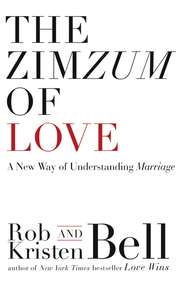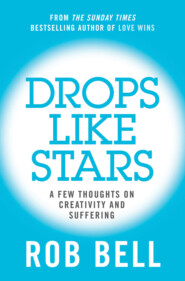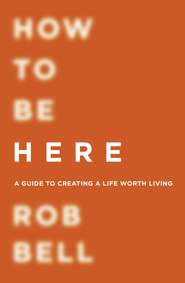По всем вопросам обращайтесь на: info@litportal.ru
(©) 2003-2024.
✖
The Complete Rob Bell: His Seven Bestselling Books, All in One Place
Автор
Год написания книги
2018
Настройки чтения
Размер шрифта
Высота строк
Поля
Longing to be comfortable in our own skin.
But the thing we are searching for is not somewhere else. It is right here. And we can only find it when we give up the search, when we surrender, when we trust. Trust that God is already putting us back together.
Trust that through dying to the old, the new can give birth.
Trust that Jesus can repair the scarred and broken image.
It is trusting that I am loved. That I always have been. That I always will be. I don’t have to do anything. I don’t have to prove anything or achieve anything or accomplish one more thing. That exactly as I am, I am totally accepted, forgiven, and there is nothing I could ever do to lose this acceptance.32 (#ulink_8a0dde28-91f6-5029-8dda-228ee8787c8c)
God knew exactly what he was doing when he made you. There are no accidents. We need you to embrace your true identity, who you are in Christ, letting this new awareness transform your life.
That is what Jesus has in mind.
That is what brings heaven to earth.
I was having breakfast with my dad and my younger son at the Real Food Café on Eastern Avenue just south of Alger in Grand Rapids. We were finishing our meal when I noticed that the waitress brought our check and then took it away and then brought it back again. She placed it on the table, smiled, and said, “Somebody in the restaurant paid for your meal. You’re all set.” And then she walked away.
I had the strangest feeling sitting there. The feeling was helplessness. There was nothing I could do. It had been taken care of. To insist on paying would have been pointless. All I could do was trust that what she said was true was actually true and then live in that. Which meant getting up and leaving the restaurant. My acceptance of what she said gave me a choice: to live like it was true or to create my own reality in which the bill was not paid.
This is our invitation. To trust that we don’t owe anything. To trust that something is already true about us, something has already been done, something has been there all along.
To trust that grace pays the bill.
MOVEMENT SEVEN Good (#ulink_2eca09b8-cff1-558b-aec6-13cf04a0d562)
It is such a letdown to rise from the dead and have your friends not recognize you.
The writer John tells us that Mary saw Jesus after his resurrection but did not realize it was Jesus. Jesus asked her, “Woman, why are you crying? Who is it you are looking for?”
“Thinking he was the gardener, she said . . .”1 (#ulink_db0e3f71-ffb6-5799-b0a2-dece5c4fd3ab)
I love that line “thinking he was the gardener.” It is so loaded. Jewish writers like John did things like this all the time in their writings. They record what seem to be random details, yet in these details we find all sorts of multiple layers of meaning.2 (#ulink_6ab14c0e-beb0-5822-aad2-be58dcca4ae1) There are even methods to help decipher all the hidden meanings in a text. One is called the principle of first mention. Whenever you come across a significant word in a passage, find out where this word first appears in the Bible. John does this in his gospel. The first mention of the word love is in 3:16—“For God so loved the world that he gave his one and only Son.” We then discover that love is first mentioned in Genesis 22 when God tells Abraham to take “your son, your only son, Isaac, whom you love” and offer him as a sacrifice. John is doing something intentional in his gospel: He wants his readers to see a connection between Abraham and his son, and God and God’s son. John’s readers who knew the Torah would have seen the parallels right away.
Back to the empty tomb and Mary’s inability to recognize Jesus. She mistakes him for a gardener. Where is the first mention of a garden in the Bible? Genesis 2, the story of God placing the first people in a . . . garden. And what happens to this garden and these people? They choose to live outside of how God made them to live, and they lose their place in the garden. Death enters the picture and paradise is lost.
John tells us that Jesus is buried in a garden tomb. And Jesus is mistaken for a gardener. Something else is going on here. John wants us to see a connection between the garden of Eden and Jesus rising from the dead in a garden. There is a new Adam on the scene, and he is reversing the curse of death by conquering it.3 (#ulink_ff5f3539-6e72-5bba-bd93-c335f65ebaee) As one writer put it, “It was impossible for death to keep its hold on him.”4 (#ulink_6f61e825-416f-5904-a4f5-ff486940f9c3) And he’s doing it in a garden. He’s reclaiming creation. He’s entering into it and restoring it and renewing God’s plans for the world.
Jesus is God’s way of refusing to give up on his dream for the world.
Our Environment
To look at God’s restoration plans in greater depth, we need to go back to how God creates the world and what he thinks about it. The Bible starts with God making the ground and the seas and calling them “good.” God makes land that produces vegetation and it is “good.” Over and over this word good is used to describe how God perceives what he has made. It is all “good.”
Notice what God does with his “good” creation. “Then God said, ‘Let the land produce vegetation: seed-bearing plants and trees on the land that bear fruit with seed in it, according to their various kinds.’ And it was so.” The next verse is significant: “The land produced vegetation.”5 (#ulink_a92fcacd-fddf-5962-b1e4-e52a368d80e4) Notice that it doesn’t say, “God produced vegetation.” God empowers the land to do something. He gives it the capacity to produce trees and shrubs and plants and bushes that produce fruit and seeds. God empowers creation to make more.
This happens again in Genesis 1:22 when God blesses the creatures of the water and sky and then says, “Be fruitful and increase in number and fill the water in the seas, and let the birds increase on the earth.” Once again God gives creation—here it is fish and birds—the ability to multiply and make more. God doesn’t make more fish; God gives fish the ability to make more.
An important distinction.
God empowers creation to make more and in doing so loads it with potential. It is going to grow and change and move and not be the same today as it was yesterday, and tomorrow it will move another day forward. Creation is loaded with potential and possibility and promise.
God then makes people whom he puts right in the middle of all this loaded creation, commanding them to care for creation, to manage it, to lovingly use it, to creatively order it. The words he gives are words of loving service and thoughtful use. From day one (which is really day six), they are in intimate relationship and interaction with their environment. They are environmentalists. Being deeply connected with their environment is who they are. For them to be anything else or to deny their divine responsibility to care for all that God has made would be to deny something that is at the core of their existence.
This is why litter and pollution are spiritual issues.
And until that last sentence makes perfect sense, we haven’t fully grasped what it means to be human and live in God’s world. Everyone is an environmentalist. We cannot live independently of the world God has placed us in. We are intimately connected. By God.
Not only are we connected with creation, but creation is going to move forward. It can’t help it. It is loaded with energy. It’s going to grow and produce and change and morph. This point is central to the story: The garden of Eden is not perfect.6 (#ulink_3d004a30-0697-520a-81c6-97514501c80e) Nowhere in Genesis does it say it is perfect. The word the Bible uses is good. There is a difference. When we say “perfect,” what we generally mean is “static” or “fixed” or “unchanging.” It has reached a state in which there is going to be no more change. But this is not what Genesis says about the garden of Eden. Good means changing and growing and advancing and producing new things. And so these people are placed in the midst of this dynamic, changing, alive, vibrant environment and charged with the divine responsibility of doing something with it. Creating, arranging, ordering, caring for—doing something with it.
These first people have a choice: to do something with it in harmony with God or to use it for their own purposes. And not doing something with it is a choice as well. It would be a sin to abuse creation and distort it and rape it and exploit it, but it would also be a sin to do nothing with it. Because doing nothing with it would essentially be saying to God, “You have made nothing of interest to me.”7 (#ulink_8dd6f485-6ccd-5583-8486-41816d2c592e)
So the issue of eating the fruit then is far bigger than Adam and Eve simply disobeying God. They are throwing off the whole deal. God made this magnificent world with endless possibilities of creativity and beauty and meaning, and they miss it. They decide to steer the thing in a different direction. A direction of their choosing.
God has given us power and potential and ability. God has given this power to us so we will use it well. We have choices about how we are going to use our power. The choices of the first people were so toxic because they were placed in the middle of a complex web of interaction and relationships with the world God had made. When they sinned, their actions threw off the balance of everything.
Weather.
Trees.
Oceans.
It is all one, and when one part starts to splinter and fracture, the whole thing starts to crumble. These people cannot be separated from their environment. One part falls out of harmony, and everything is affected. As one text says, “The whole creation has been groaning.”8 (#ulink_9139870b-8624-53b7-9110-78dc62d255d3) It is all thrown off.
This is how the Bible starts.
Unlimited potential.
Unbelievable promise and possibility.
And then fracturing, splintering, chaos.
Moving Forward
Will creation always be like this? Fractured? Chaotic? This has been the question for thousands of years. And central to the Jewish world of Jesus was the belief that God not only hadn’t given up on creation but was also actively at work within it, bringing it back to how he originally intended it to be. The prophets had a way of talking about this restoration movement of God’s. They spoke of God reclaiming the earth and restoring the world. They did not talk about people going somewhere else at the end of time. They talked about God coming here at the end of time.9 (#ulink_be6fc7fd-c4ce-514e-aa19-a92d70a7b851)
Notice what Jesus says about the end of the world in Matthew: “Truly I tell you, at the renewal of all things, when the Son of Man sits on his glorious throne . . .”10 (#ulink_f88dd892-dd97-53bd-ab97-498681639510)
Jesus uses an important word here: renewal.
Jesus describes his return as a rebirth, a regeneration, a renewal.
Remember, when God made the world, he called it good. Why would God destroy something he thinks is good?
Notice what Peter says in the book of Acts about the same event: “Heaven must receive [Jesus] until the time comes for God to restore everything, as he promised long ago through his holy prophets.”11 (#ulink_8b1849d9-7943-5b79-a455-c2f88dc5d107) Big word Peter uses here: restore. To restore is to make things how they once were. To renovate, to rebuild, to put back together the parts that are broken.
As Paul put it in Colossians, “For God was pleased to have all his fullness dwell in [Jesus], and through him to reconcile to himself all things, whether things on earth or things in heaven, by making peace through his blood, shed on the cross.”12 (#ulink_3b996bfd-3d2e-553d-844e-c1dcffdfcab8) Paul uses another significant word here: reconcile. To make peace where it has been lacking. To bring back together. To mend what is torn and to fix what is broken. And Paul wants us to make sure we grasp that this is a much larger issue than just human souls. He uses the phrase “all things, whether things on earth or things in heaven” because he wants us to see that this is all of creation. “All things” really means “everything”—every bird and tree and mountain and star and every single square inch of the physical creation.
In Jesus, God is putting it all back together.











